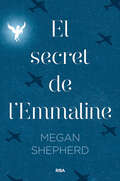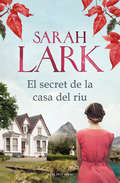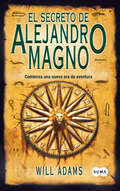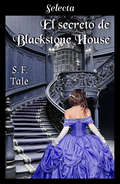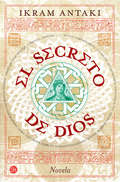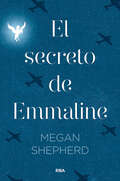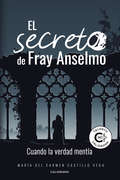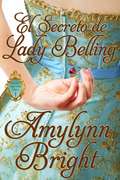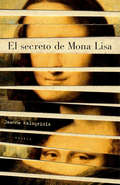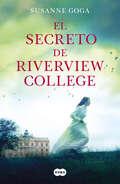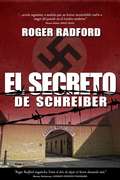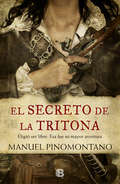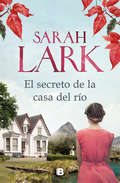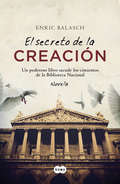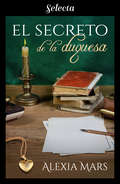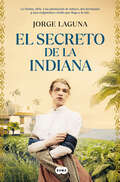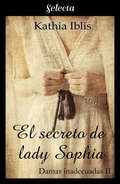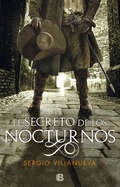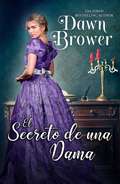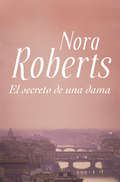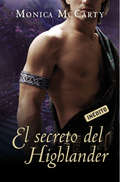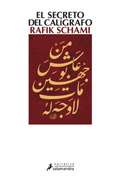- Table View
- List View
El saqueo de la Argentina
by María Seoane"El saqueo de la Argentina" no es una novela de piratas, como su título puede sugerir, sino el relato de una historia reciente: la de las últimas décadas de un país que alguna vez fue comparado con los Estados Unidos y Europa, y terminó saqueado por una constelación de intereses internos y externos que se repartió la riqueza de la mayoría e incluso, lo que es aun más grave, procuró despojar a los argentinos de su identidad histórica y cultural. Minuciosa en el seguimiento de los hechos, partiendo de una abundante documentación que interpreta con rigurosidad pero también con el apasionamiento propio de alguien comprometido con la sociedad a la que pertenece, Maria Seoane nos describe la matriz de un verdadero trauma histórico. El saqueo que comenzó con la apropiación de vidas bajo la dictadura militar terminó con la destrucción del aparato productivo, el remate de los bienes públicos, el desmantelamiento del Estado, el mayor endeudamiento de la historia, la fuga de capitales, el apoderamiento ilegítimo de ahorros y el derrumbe del nivel de vida de la mayor parte de la población. Si es cierto que algunos fueron engañados por el espejismo del neoliberalismo impuesto por los centros de poder internacionales y difundido por sus epígonos locales, la responsabilidad de lo que pasó, y los beneficiarios, tienen nombre y apellido. La descripción y el análisis de personajes y políticas sirven, sobre todo, para develar la trama de intereses que constituye el trasfondo de este proceso. Políticos corruptos, empresarios nacionales e internacionales voraces, organismos internacionales, economistas y funcionarios cómplices del desvarío que significó la aplicación de un modelo económico perverso fueron apoderándose de las instituciones, el patrimonio y el destino de la Argentina. Maria Seoane se pregunta cómo los argentinos podrán volver a la gran nación que soñaron. Una de las respuestas está en asimilar, de una vez y para siempre, las enseñanzas de este libro, tan apasionante como indispensable.
El secret de l'Emmaline
by Megan ShepherdNomés la mirada d’un nen pot combatre la foscor. «Em dic Emmaline i tinc un secret. No l’explicaré a ningú, ni a en Benny, ni a l’Anna, ni tan sols a la germana Constance. El meu secret s’amaga als miralls que reflecteixen les elegants estances que en una altra època van ser la llar d’una princesa bonica i que avui habitem nosaltres. Però a tu sí que te l’explicaré: hi ha cavalls alats que viuen als miralls de l’hospital de Briar Hill.» Desembre del 1941. El bombardejos alemanys assolen les ciutats d’Anglaterra i molts nens són evacuats al camp. Els més malalts i traumatitzats són traslladats a hospitals especials. L’Emmaline és una d’aquestes nenes. Però ella és diferent, ja que té una cosa que no tenen els altres. Un secret que li permetrà trobar el color en un món gris.
El secret de la casa del riu
by Sarah LarkUna història apassionant, que enganxa el lector, sobre com el passat pot irrompre amb força i canviar el present. NOMÉS SI ESBRINA EL PASSAT DE LA SEVA FAMÍLIA PODRÀ TROBAR-SE A SI MATEIXA Viena, en l'actualitat. A causa de la inesperada malaltia de la seva cosina més estimada, l'Ellinor descobreix un secret familiar ocult fins aleshores per la seva mare: l'àvia materna de la jove va ser una nena adoptada, així que ni ella ni la seva mare estan biològicament vinculades a qui han considerat sempre la seva família. A la recerca dels seus orígens, l'Ellinor viatja a Dalmàcia, on descobrirà que el seu besavi, en Frano Zima, va desaparèixer fa molts anys enmig de la nit, probablement rumb a Nova Zelanda. Seguint el seu rastre, descobrirà una tràgica i emocionant història d'amor i de desamor.
El secreto de Alejandro Magno
by Will AdamsA la muerte de Alejandro Magno, incalculables riquezas lo acompañaron en su tumba, una de las maravillas del mundo que ha permanecido perdida hasta hoy. Alejandro Magno es el conquistador más grande y enigmático de la Historia. Su legendaria tumba, una de las maravillas de la Antigüedad, al parecer se perdió para siempre. Mucho más tarde, unos obreros de la construcción encuentran por casualidad en Alejandría la entrada de una catacumba. Este hecho desencadena una carrera a muerte en busca del mayor tesoro de todos los tiempos. Daniel Knox es un egiptólogo marginado por las corruptas autoridades arqueológicas. La fascinación que siente por Alejandro Magno y su tumba podría llevarle a la muerte. Perseguido por el brutal magnate naviero Hassan al-Assyuti, su única posibilidad de seguir con vida pasa por ganar esta frenética carrera. Sin embargo, más gente anda a la caza del mismo premio, y matarán por conseguirlo... Una carrera a muerte en busca del mayor tesoro de todos los tiempos.
El secreto de Blackstone House
by S. F. TaleUna historia de amor y secretos en plena campiña inglesa. Para la señorita Josephine Morgan no entra dentro de sus planes casarse. Tras un trágico suceso acaecido años atrás, se prometió a sí misma no entregarse a ningún hombre, mucho menos entablar alguna relación con un noble. Ha visto como sus sueños se truncaban por tener que cuidar a su abuela, que le recordará que su deber es contraer matrimonio. Todo cambiará cuando en su camino se cruce un misterio joven. Sir Killian Blackstone a sus veintisiete años está convencido que su destino es morir solo. Sobre él pende un oscuro secreto familiar que lo mantiene encerrado en su mansión de Puckley, alejado de sus seres queridos, como de la vida social de la capital. Mas, una noche en el bosque, se encontrará con una muchacha que, en vez de alabarlo, arremeterá contra él sin amilanarse. En ese instante, dos mundos opuestos colisionarán; deberán replantearse todo aquello enlo que creían y, además, deberán abrir el corazón, pues, a veces, las apariencias engañan.
El secreto de Dios
by Ikram AntakiUna novela sobre la búsqueda espiritual más trascendente: la del secreto de Dios Esta novela narra la historia de una familia con ocho siglos de antigüedad, originaria de la ciudad turca de Antioquía, que sufre el exilio y la decadencia debido a las convulsiones políticas de principios del siglo XX: es el fin de una era de esplendor, de riquezas, de pueblos y familias con raíces ancestrales, y de patriarcas con poder sobre vidas y haciendas, para dar un paso forzado a la integración de los valores del occidente moderno.La narración a cuatro voces va de lo fantástico a la descripción histórica, habla de las relaciones entre los miembros de una familia siria, y en su trama se exploran las tradiciones conyugales, el machismo, la sexualidad femenina, la construcción de los núcleos familiares y la búsqueda de la divinidad.
El secreto de Emmaline
by Megan ShepherdMe llamo Emmaliney tengo un secreto... Una historia de amor, amistad y fantasía que te invita a soñar.Una lectura inolvidable. Diciembre de 1941. Los bombardeos alemanes asolan las ciudades de Inglaterra y muchos niños son evacuados a la campiña. Los más enfermos y traumatizados son trasladados a hospitales especiales. Emmaline es una de esas niñas. Pero ella es diferente, ya que posee algo de lo que carecen los demás. Un secreto que le permitirá encontrar el color en un mundo gris, porque... solo la mirada de un niño puede combatir la oscuridad.
El secreto de Fray Anselmo: Cuando la verdad mentía
by María del Castillo VegaEra asunto de interés y así se lo haría saber el que conociera todos los detalles del crimen perpetrado por su sobrino don Pedro hacía cuarenta y cinco años en Granada, el 22 de noviembre de 1521. Ambientada en la España del siglo XVI, fray Anselmo de la Santísima Trinidad vio tambalear los cimientos de su apacible existencia cuando le fue revelado, bajo secreto de confesión, un crimen cometido en un pequeño pueblo del temple nazarí. Huyendo de su propia conciencia, inició un peregrinaje de remordimientos con rumbo a las Américas, sin ser consciente de que su destino se anclaría para siempre en la acogedora isla de Gran Canaria. Allí fraguaría eterna amistad con el carpintero Plácido Cebrián y con su bellísima esposa, la canaria doña Mariana, atormentándose por el reencuentro vivido con la desequilibrada Bibiana, una morisca a quien había dejado internada por loca en el Hospital Real de Granada. Por lo que asumió las consecuencias de una historia de amor de cuya filiación su verdad fue engañada. No sería, pues, la primera vez que lo que uno cree que es no es ni la sombra de su revés. Al oído le susurraba que por favor transcribiera todas las palabras que emitiera su debilitada garganta, pues debería testimoniar la historia que iba a escuchar y encargarse de hacerla llegar hasta el lugar donde debiera; aunque pensara que el tema no le incumbiera, e irreal y fantástica la situación le pareciera.
El secreto de Joel (Contigo a cualquier hora #Volumen 12)
by Marian ArpaOtra atrapante entrega de la aplaudida serie Contigo a cualquier hora. ¿Te apetece disfrutar de la historia de amor de un gigoló de Barcelona y una emprendedora de Santander? Déjate envolver por las idas y venidas de esta pareja que no está buscando el amor. Joel es un hombre con una infancia que lo marcó. Joel vive según sus propias normas, pues desde siempre se ha tenido que sacar las castañas de fuego sin ayuda de nadie. Después de crecer en un orfanato se ha hecho a sí mismo, nunca le han regalado nada. Gracias a sus esfuerzos y tesón vive en una zona exclusiva de Barcelona. Y también guarda un gran secreto... Además, recibe unos correos de chantaje que lo tienen de un humor de perros. Marga es una mujer muy decidida que trastocará toda la existencia de Joel. Marga es una mujer emprendedora que cuando se cruza en la vida de Joel se la pone patas arriba. A él le encanta y le sorprende a partes iguales. Y empieza a replantearse ciertos aspectos de su vida... Sin embargo, cuando Marga se entere de la ocupación secreta de Joel ¿lo aceptará?
El secreto de Lady Belling
by Amylynn BrightLady Belling está comprometida cuando el amor de su vida vuelve a Londres <p><p> Francesca Belling está dividida entre dos mundos: su eterna obsesión con el mejor amigo de su hermano y sus futuras obligaciones. Nunca pensó terminar en la cama de su amor platónico, Thomas Wallingham, pero allí es exactamente donde terminó. <p> Desafortunadamente, el correo va lento durante la guerra. Ella pensó que él sabía todo. Él no lo sospechaba. <p> Thomas siempre había querido ser parte de la familia Belling, pero fue demasiado ingenuo para agarrar la oportunidad cuando ella se le lanzó antes. En vez de eso, se fue a la guerra. Envalentonado por la reciente apreciación a esta nueva y crecida Francisca, se da cuenta de que ese sueño está a su alcance. <p> Si ella cree que él huirá esta vez, no tiene idea de lo que se le avecina.
El secreto de Mona Lisa
by Jeanne KalogridisUn emocionante relato que aporta luz nueva a uno de los misterios más subyugantes del Renacimiento: la relación del inigualable maestro Leonardo da Vinci con la mujer que le sirvió de inspiración y modelo. «Mi historia no comienza con mi nacimiento, sino con un asesinato... El crimen que unió a mis padres, que los unió a mí... Mi nombre es Lisa di Antonio Gherardini, aunque para los conocidos soy sencillamente Mona Lisa.» Italia, año 1478. Una sinuosa trama de espionaje, narrada y protagonizada por la propia madonna Lisa, se convierte en una apasionante historia de amor, traición y luchas de poder repleta de secretos por desvelar y pasiones que ocultar. La investigación de un brutal asesinato nos sumerge en la Florencia de los Médicis: un escenario asfixiante, dominado por las disputas entre las familias más poderosas de la ciudad, las maquinaciones cortesanas y los intereses papales, sobre el que se cierne la amenaza del vehemente y austero predicador Savonarola. Reseña:«Kalogridis logra dar vida a la apasionada mujer hasta ahora escondida tras la enigmática sonrisa de La Gioconda.»Publishers Weekly
El secreto de Riverview College
by Susanne GogaUn laberinto bajo la ciudad de Londres, una estudiante desaparecida y una joven en busca de un antiguo secreto. Londres, 1900. Tras la muerte de sus padres, Matilda Gray prometió convertirse en una mujer fuerte e independiente y por fin ha logrado su sueño de ser profesora en una escuela exclusivamente femenina, el prestigioso Riverview College. Cuando su estudiante favorita, Laura, deja de acudir a clase, Matilde presiente que la muchacha está en peligro. Su desaparición fue demasiado repentina y las excusas de su tutor legal demasiado endebles. Un mensaje escondido en una postal llegada de Italia pone a Matilda sobre la pista de la chica. Su investigación la conduce hasta el historiador Stephen Fleming y, junto a él, a un antiguo secreto oculto en los más recónditos rincones de la ciudad. Por la autora de El misterio de ChalkHill, una historia de intriga y amor en la Inglaterra victoriana que emocionará a los lectores de Kate Morton, Anne Jacobs o Lucinda Riley.
El secreto de Schreiber
by Carlos Ucar Roger RadfordNazi. Fugitivo. Sádico. ¿Quién es el verdadero Hans Schreiber? Dos periodistas dirigen una búsqueda desesperada con objeto de descubrir al Schreiber real en esta angustiosa historia de suspense, situada entre dos épocas, con una revelación de secretos inimaginables... y el juicio a un monstruo. El reportero de sucesos, Mark Edwards, y su colega, Danielle Green, se enfrentan a pistas falsas y a una trama enrevesada e insólita al tiempo que procuran descubrir el terrible secreto de un sádico nazi que ha proseguido con sus métodos asesinos en el Londres moderno. La historia discurre desde un campo de tránsito en tiempos de guerra de Checoslovaquia hasta la Alemania contemporánea; desde un barrio londinense al Old Bailey, el tribunal penal más famoso del mundo, donde dos hombres se afanan por afirmar que el otro es el verdadero Hans Schreiber. "El secreto de Schreiber" es un absorbente relato sobre un odio y un horror inimaginables, que se ocupa de la cuestión de la identidad. ¿Quién es el verdadero Hans Schreiber?
El secreto de la Tritona
by Manuel PinomontanoSecretos, conspiraciones, travesías, amores imposibles y crímenes, en una novela protagonizada por Gregoria Salazar, gitana, indiana y pirata, una heroína épica a la que solo guiaba su implacable búsqueda de la libertad. Gregoria es la capitana de un barco pirata. Tanto el rey Carlos III como el Papa han puesto precio a su cabeza. Dese su navío en el Caribe, se dispone a narrar sus memorias a su nieta, quien está a punto de casarse con un virrey. Una prostituta y una condesa son otras de las mujeres de esta gran historia familiar que recorre los escenarios más fascinantes del siglo XVIII.
El secreto de la casa del río
by Sarah LarkUna historia apasionante y envolvente sobre cómo el pasado puede irrumpir con fuerza y cambiar el presente para siempre. Solo descubriendo el pasado de su familia podrá encontrarse a sí misma. Viena, en la actualidad. A causa de la inesperada enfermedad de su prima más querida, Ellinor descubre un secreto familiar oculto hasta entonces por su madre: la abuela materna de Ellinor fue una niña adoptada, por lo que ni ella ni su madre están biológicamente vinculadas a la que hasta entonces ha considerado su familia. En busca de sus orígenes, Ellinor viaja a Dalmacia, donde descubrirá que su bisabuelo, Franzo Zima, desapareció en medio de la noche probablemente rumbo a Nueva Zelanda. Siguiendo su rastro, descubrirá una trágica y emocionante historia de amor y desamor.
El secreto de la creación
by Enric BalaschUn poderoso libro sacude los cimientos de la Biblioteca Nacional. Algo extraño ocurre en la Biblioteca Nacional. Los robos de libros antiguos se suceden, pero algunas de esas sustracciones son demasiado insólitas como para que pasen desapercibidas. ¿Qué buscan los ladrones? ¿Quién ha encargado esos robos? También en el siglo XVI alguien encargó el robo de un valioso libro. «Una leyenda asegura que Dios reveló a un rabino el secreto de la creación», afirma un crédulo Felipe II a su fiel agente secreto Bernardino de Mendoza, a quien ordena que le consiga el Libro de Dios, tres láminas de oro en las que se recoge la fórmula alquímica para crear golems, unos seres animados de origen artificial muy presentes en la mitología judía. Cuatro siglos después, en una sala de subastas de Madrid, un hombre y una mujer pujan por conseguir un raro ejemplar de un libro escrito por un alquimista cordobés en el siglo XVI. A la salida de la subasta, Julián Castilla, periodista de El País, se acerca a la mujer con la intención de concertar una entrevista con ella para un artículo sobre las inversiones de capital en arte. Sin embargo, la mujer aparece asesinada al día siguiente. Poco después, el periodista será testigo de nuevos crímenes, en cuya investigación tendrá que recurrir a sus amplios conocimientos históricos y viajar hasta Praga y Jerusalén. Su pesimista determinación se verá compensada por una insólita alianza y el deseo de disfrutar de los placeres de la vida.
El secreto de la duquesa
by Alexia MarsUn viaje trepidante por el Londres victoriano donde el suspense y el amor se unen para desentrañar un misterio en el que nada es lo que parece. ¿Venderías tu alma para hacer justicia? ¿Arriesgarías tu honor por la persona a la que amas?Un asesinato, un culpable y un amor que florece contra todo pronóstico. El primer domingo de mayo de 1842 la ciudad de Londres despertó con una trágica noticia, la muerte de la popular duquesa de Nolford. Los primeros indicios señalan como causa de la desgracia un incendio accidental y así lo decreta Derek Wayne, detective de Scotland Yard y encargado del caso. Pero, cuando todo parecía sumamente claro, aparece en escena la señorita Eleanor Grant y echa por tierra su teoría aportando pruebas que apuntan a que su amiga ha sido asesinada. Eleanor no necesita buscar un culpable pues sabe muy bien quién esel responsable de esta atrocidad y se esforzará por demostrarle a todo Londres quién está detrás de la muerte de Harmony. Ahora deberá convencer al testarudo detective de que ella es la única que puede ayudarlo en el caso. Eleanor intentará hacer justicia al mismo tiempo que procura esconder su mayor secreto. Así, Derek se verá arrastrado a una vorágine que lo llevará a enfrentarse al mayor misterio de su carrera, mientras lidia con esa testaruda mujercita que insiste en inmiscuirse en la investigación y meterse en su corazón. Harmony Brunet tenía la vida perfecta: amor, dinero y popularidad. Derek y Eleanor arañarán su pasado y juntos descubrirán quién era realmente la duquesa y qué escondía. Las pistas señalan al duque como culpable de su asesinato. Pero ¿será realmente su verdugo? ¿O tal vez otra víctima?
El secreto de la indiana
by Jorge LagunaUna extraña muerte. Dos hermanos en la ruina. Y la llegada de una desconocida inversora que oculta un gran secreto. Una extraña muerte. Dos hermanos en la ruina. Y la llegada de una desconocida inversora que oculta un gran secreto. Isla de la Palma, 1876. Miguel y Alejandro son gemelos y acaban de heredar la fábrica de tabacos La Indiana de forma repentina. Ambos quieren continuar con el negocio familiar, pero descubren que está al borde de la quiebra. La única opción es la venta.Eliana, oriunda de Cuba, acaba de instalarse en la isla. Fascinada por la tabaquera, está dispuesta a invertir en el negocio para ayudarlos. Pero la mujer oculta un secreto que si se descubre puede arruinar la vida de todos. Haciendo gala de un estilo evocador y una ambientación preciosista que nos traslada a la España de las últimas colonias y a las consecuencias de un pasado esclavista, Jorge Laguna ofrece a los lectores una historia que seduce y atrapa. Amor, relaciones prohibidas, secretos, masonería, esclavismo y homosexualidad... El secreto de La Indiana es una novela conmovedora que explora los límites del poder y de la traición, en la que los personajes son víctimas de su pasado en una dinastía familiar que se ha esforzado durante décadas en salvar las apariencias.Instagram: jorgelaguna94 Twitter: @JorgeLaguna94
El secreto de lady Sophia (Damas inadecuadas #Volumen 2)
by Kathia IblisContinúa la serie «Damas inadecuadas». Una historia apasionante ambientada en la época victoriana.Él solo anhelaba descubrir su secreto... sin saber que podría destruir su futuro. Lady Sophie Douglas se ve arrastrada a aceptar el consejo de su primo y alejarse de su familia escocesa, a la que ama y por la que daría su vida, para ser parte de la sociedad londinense y ocultar así un secreto que podría poner en riesgo a todos. Su estadía en Londres no será tan fácil como creía, sin embargo, cuenta con la ayuda de una tía que tejerá un plan para que nadie pueda hacerle daño. Nathaniel Saoirse MacKenzie Howard tiene una misión y hará cualquier cosa por cumplirla, incluso entregar su corazón.
El secreto de los nocturnos
by Sergio VillanuevaUn brutal asesinato. Una investigación a contrarreloj. Una ciudad hermética. Una incómoda verdad. Valencia, 1589. Un alto representante del clero y persona de confianza del Rey Felipe II encuentra la muerte entre las sombras silenciosas de la noche. La necesidad de taparlo y encontrar a los culpables provocará que las altas cúpulas de la Santa Inquisición recurran a un habitual colaborador, el padre Francisco Agustín Tárrega. Las capacidades analíticas y deductivas del padre Tárrega lo embarcarán, junto a sus pupilos de artes teatrales, Guillem de Castro y Lope de Vega, en la resolución de un misterio que sacará a la luz peligrosas intrigas que agitarán a las altas esferas del poder. mTodo ello en el marco de una población y un tiempo en el que las diferentes culturas conviven con el miedo y la desconfianza. Una época en la que también la razón, la esperanza y la lógica escapaban de la férrea sombra católica en reuniones clandestinas y sociedades secretas.
El secreto de los nocturnos
by Sergio VillanuevaUn brutal asesinato. Una investigación a contrarreloj. Una ciudad hermética. Una incómoda verdad. Valencia, 1589. Un alto representante del clero y persona de confianza del Rey Felipe II encuentra la muerte entre las sombras silenciosas de la noche. La necesidad de taparlo y encontrar a los culpables provocará que las altas cúpulas de la Santa Inquisición recurran a un habitual colaborador, el padre Francisco Agustín Tárrega. Las capacidades analíticas y deductivas del padre Tárrega lo embarcarán, junto a sus pupilos de artes teatrales, Guillem de Castro y Lope de Vega, en la resolución de un misterio que sacará a la luz peligrosas intrigas que agitarán a las altas esferas del poder. mTodo ello en el marco de una población y un tiempo en el que las diferentes culturas conviven con el miedo y la desconfianza. Una época en la que también la razón, la esperanza y la lógica escapaban de la férrea sombra católica en reuniones clandestinas y sociedades secretas.
El secreto de una dama
by Dawn Brower Bárbara Rojas NúñezAlgunos secretos nunca deberían ser revelados… En lo que concierne a la señorita Helena Carter no es algo malo ser ilustrada e ignorada. Ella no quiere nada más que su independencia. Su padre no ha hecho su vida fácil, y todo lo que su madre quiere es que encuentre un esposo—cualquier hombre servirá. Para poder lograr su meta maquina un plan a prueba de tontos para lograr su más grande deseo. Sólo hay un problema, y un hombre está al centro de ello. Algunos secretos no pueden ser guardados… El señor Oliver Hunt, el Marqués de Dashville ha sido plagado de rumores e insinuaciones por cinco años, y todo es culpa de la señorita X. Él hizo un movimiento en falso en su alocada juventud y ha estado pagándolo desde entonces. Determinado a hacer que la señorita de los susurros lo vea de manera diferente, planea enmendar las cosas con la primera señorita que Dash ofendió. Busca a la señorita Helena para ese propósito, pero ella no quiere tener nada que ver con él. Descubrir un secreto puede ser dulce… Mientras ellos continúan cruzando caminos, hay chispas de deseo entre ellos. Su romance en ciernes es puesto a prueba mientras los secretos son revelados, y estas revelaciones los empujarán más cerca o los separarán por siempre.
El secreto de una dama
by Nora RobertsUna experta en arte y un ladrón de guante blanco se ven atrapados en un peligroso juego en esta novela repleta de intriga y deseo, por la autora best seller Nora Roberts. Miranda Jones, especialista en el análisis de bronces renacentistas, viaja a Florencia para verificar la autenticidad de La dama oscura. A ella le parece, desde el principio, una obra de juventud de Miguel Ángel, pero análisis posteriores confirman que la escultura es una burda copia. Miranda está segura de que el bronce sobre el que ella trabajó era original e intentará probarlo con la ayuda de Ryan Boldari, un seductor ladrón de guante blanco. A la atracción amorosa que surge inmediatamente entre Ryan y Miranda mientras intentan encontrar la escultura original, se unirá el acoso de una misteriosa figura dispuesta a terminar con la reputación y la vida de Miranda. Reseña:«Un libro que entusiasmará a las legiones de fans de NoraRoberts.»Library Journal
El secreto del Highlander (Los MacLeods #Volumen 2)
by Monica McCartyAmor, pasión, alegría, enfado, ira... Segunda novela de la saga escocesa de los MacLeod. Meg Mackinnon sabe que debe encontrar un marido fiel que pueda afianzar el poder de su hermano, el futuro jefe del clan. Cuando Meg deja la corte para empezar la búsqueda de un pretendiente, cae víctima de la emboscada de unos forajidos. El tipo misterioso que sale en su rescate no cumple ninguno de los requisitos que ella tenía en mente, pero sí despierta en Meg una pasión innegable. Es Alex MacLeod, que se define a sí mismo como un mercenario, un hombre que no debe lealtad a nadie. Pero pronto Meg empieza a sospechar que Alex no es lo que parece, y deberá aprender a confiar en su corazón si no quiere arriesgarse a perder para siempre al hombre de su vida. Reseña:«Picante, rápida y fascinante una lectura que deja sin aliento.»Julia London
El secreto del calígrafo
by Rafik SchamiUn vibrante retrato de Damasco en los años posteriores a la independencia, cuyos protagonistas son un reputado calígrafo, una mujer de gran belleza y un joven cristiano de noble carácter. En las populosas calles de la ciudad vieja, el rumor se extiende como una marea: Nura, la joven y bella esposa del afamado calígrafo Hamid Farsi, se ha fugado de casa sin dejar rastro. De inmediato, cientos de voces especulan sobre los motivos de tal desplante. ¿Habrá sucumbido al insistente ruego del célebre donjuán Nassri Abbani, que para conquistar la única pieza que se le resiste ha acudido nada menos que al marido de su presa para que le escriba fogosas cartas de amor? ¿O habrá huido tal vez de la asfixiante vida conyugal a la que la sometía su esposo, seducida por el embrujo de algún joven dispuesto a compartir el amor por los libros, la libertad y el gozo de vivir? Quizá la respuesta esté en el propio Hamid, que guarda un secreto que podría ocultar la clave del misterio. En este cautivante fresco de la vida damascena a mediados del siglo pasado, Rafik Schami va delineando con gran riqueza de matices los perfiles de una serie de personajes que impregnan la retina del lector con la embelesadora vitalidad de una de las ciudades más emblemáticas de Oriente Próximo.

